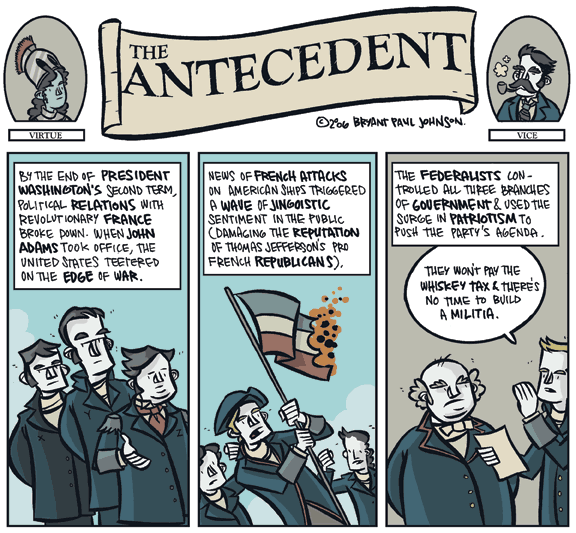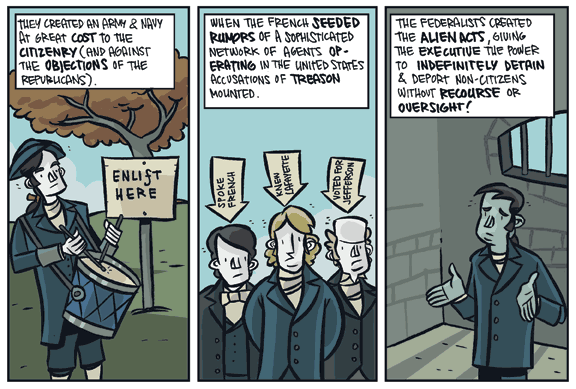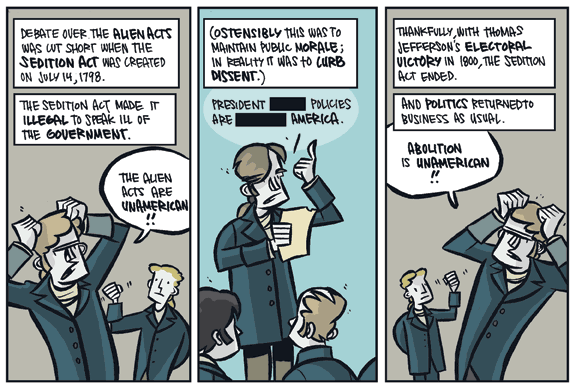


Endnotes
By President George Washington’s second term in office the political landscape of the United States was divided into two parties: the Federalists of John Adams and Alexander Hamilton and the Democratic-Republicans of Thomas Jefferson and James Madison (though at the time of the comic depicted above, the Democratic-Republicans were generally referred to as simply “Republicans”). These two parties were divided on a number of issues, not least of which was with whom in Europe the United States should hitch its wagon (a metaphorical wagon of course; I’m fairly certain that no wagon born of man could span the north Atlantic)
(A note about political parties: The political parties of 1798 do not corollate to the political parties of today, though some of the names do. The Republican Party of Thomas Jefferson mutated in the 1820s and for all intents and purposes, disappeared. The Republican Party of today was born in the mid 19th century from the ashes of the short-lived Whig Party.)
Federalists believed that Britain (only fifteen years removed from its war with the American colonies) more closely matched the political and economic needs of the United States and sought favor in its courts; the Republicans (most specifically, former Ambassador to France, Thomas Jefferson) believed that the United States had a long standing debt to France for the aid it provided in the American Revolution and sought closer ties to what they hoped would be an enlightened post-monarchy. The Republicans feared that the Federalists were crypto-monarchists, while the Federalists suspected that the Republicans were Jacobins looking to usurp the president, throwing the United States into a revolution as bloody as that of the French.
In November of 1794, John Jay, the former Chief Justice of the Supreme Court negotiated a treaty with Great Britain that effectively ended the United States’ relationship with France (the treaty gave the United States better trade relations with Great Britain, and gave [some] protection to its ships in European waters; the Federalists argued that without the Jay treaty, the United States would have been plunged into a second war with Great Britain, perhaps a difficult argument to swallow knowing that another war with Great Britain [the War of 1812] was only two decades away). France took this to be an act of aggression, and started preying upon ships flying American colors.
In the eyes of Jefferson’s Republicans, the Jay Treaty unfairly punished their constituents. It absolved Great Britain from repaying debts owed for “stolen” property during the American Revolution (this property, of course, refers to slaves who fled their bondage to fight for the British). From their perspective, the Federalists (most of whom served Northern and non-slave owning constituents) negotiated the treaty with the specific aim of punishing the Republicans. When John Adams took office in 1797 (having narrowly defeated Thomas Jefferson in the 1796 election) the United States had no real military force to speak of. Incapable of fighting a war with France, President Adams tried to negotiate a peaceful settlement with the French. When American diplomatic efforts were thwarted in what would become known as the XYZ Affair (three French diplomats refused to conduct peace negotiations with the United States, unless a substantial bribe was paid) the country moved towards open conflict. This conflict is sometimes referred to as the Quasi War.
When news of the XYZ Affair reached the public, there was an immediate cry for war. For the first time since the American Revolution, a federal Army was mustered (after the Revolution, military needs were filled by state militias) and a Navy built.
With a surge in patriotism, Federalists in power were able to frame the debate to their advantage. They equated patriotism with Federalism while implying that the Republicans were Jacobins and traitors (this particular type of rhetoric is completely transparent upon reflection, but entirely common today; how often does one hear the phrase “give comfort to the enemy” as a device used to curb dissent?). In the context of this political climate, President John Adams asked for and received extraordinary war powers without an actual declaration of war. During the Washington administration the federal government had to head a militia to collect taxes on alcoholic beverages in Western Pennsylvania, in what became known as the Whiskey Rebellion. Republicans feared that a standing army would give the federal government the power to enforce unfair laws, at the expense of local government. The Federalists saw a standing army as a means of maintaining law and order.
During President Adams’ administration, France was involved in a war with Great Britain and a coalition of continental powers. While it is likely that they did have agents operating in the United States, they were hardly in the position to launch an invasion. Fears of open war with France were greatly exaggerated, fueled by the clever diplomatic machinations of the French Directory (the governing body of France during Adams’ administration). By seeding doubt into the government of the United States, France insured that the Americans would spend more time worrying about homeland security than any sort of proactive foreign policy.
With fear of foreign intrigue conducted against the government, Congress and the President created the Naturalization Act and the Alien Friends and Enemies Acts. The Naturalization Act changed the requirements for becoming a citizen from two years of residence to fourteen years of residence. The Alien Friends and Enemies Acts gave the President the power to detain or deport any non-citizen; And without trial; Or Congressional oversight; And in secret. (When President Franklin Delano Roosevelt interred Japanese-Americans during the Second World War, he did so with powers granted under the Alien Acts.)
The Republicans saw this as a direct attack on their constituency (immigrants tended to side with the Republicans). With little evidence to actually support Federalist fears, the government gave itself unchecked power. The Republicans raised a fuss (fueled by virulently Republican newspapers, such as the Aurora of Philadelphia, a newspaper run by Benjamin Franklin’s grandson Benjamin Bache), accusing the government of trying to resurrect King George’s monarchy on American soil.
On July 14, 1798 (Bastille Day, coincidentally) , the Federalist controlled Congress (who voted right down party lines, 44 to 41) passed the Sedition Act, signed into law by President Adams. It made it a crime to speak ill of the government with the intent to defame, or injure. While the Sedition Act made it illegal only to speak lies about the government, it in effect served to quiet opposition entirely. With the burden of proving one’s innocence in a court of law (and with a Supreme Court entirely peopled by Federalists) newspapers and politicians could ill-afford to risk their career and livelihood in jail. Federalists in John Adams’ cabinet aggressively pursued allegations of sedition, supplied by a network of informants.
Curiously, the Sedition Act only protected the congress and the President from slander, while exposing the Vice-President (Thomas Jefferson) to the slings and arrows of the press (at this point in American history, the Vice-President was the person who received the second largest number of electoral votes; in the 1796 election, John Adams narrowly defeated Jefferson, making Adams the president and Jefferson the vice-president).
The Sedition Act was designed as a “temporary emergency power” and expired when Adams left office. More accurately, the Sedition Act was designed to give the Federalists leverage in the coming election, expiring on the chance that Adams couldn’t hold on to office (he didn’t). The framers of the Unites States Constitution never anticipated a political system divided into parties. Certain Federalists (most notably Alexander Hamilton) hoped that the Sedition Act would give the Federalist Party a permanent hegemony in the United States, thus eliminating the need for combative (and divisive) political parties.
In response to the Alien and Sedition Acts, Thomas Jefferson and James Madison drafted emergency measures to defeat what they saw as blind tyranny. They drafted the Kentucky and Virginia Resolutions (respectively) which pushed for individual states’ rights over federal jurisdiction. Fearing federal power, the Kentucky and Virginia Resolutions proposed to give individual states the ability to ignore laws that they felt unfairly persecuted their citizenry. While a just sentiment in light of a blatant abuse of power, the Kentucky and Virginia Resolutions fueled the South’s cause for succession some sixty years later.
I have always loved your work.
Thanks!
I’m pretty happy with the comic thus far; hopefully news and politics will conspire to keep me writing these things! (I suspect they will.)